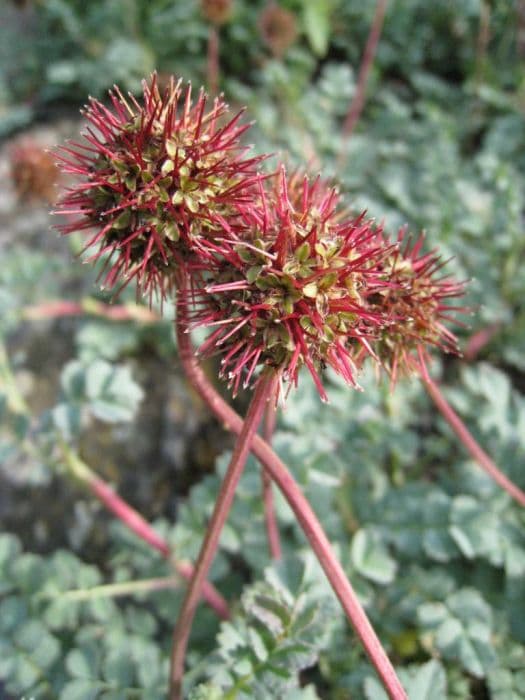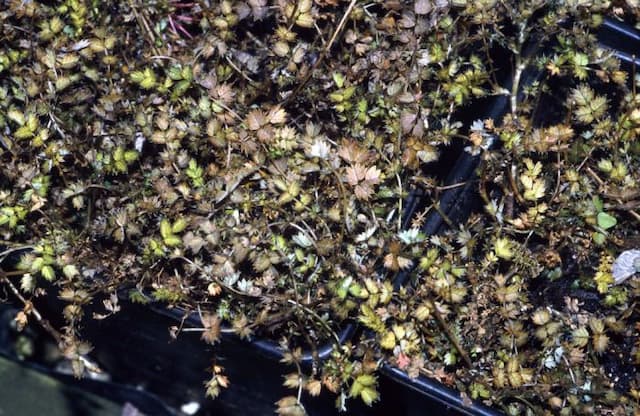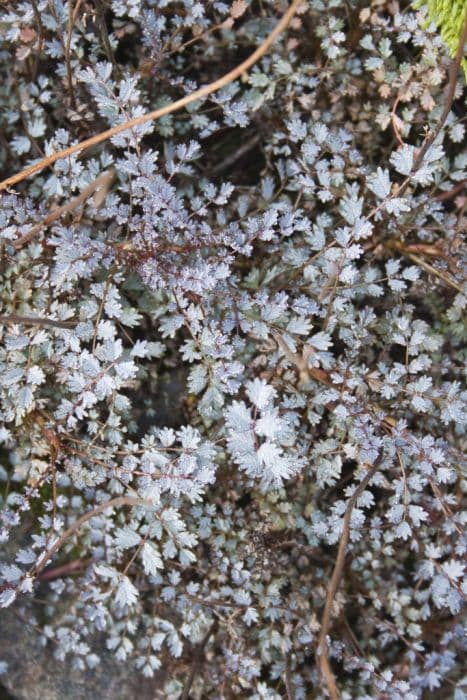Damask Rose Rosa 'La Ville de Bruxelles' (D)

ABOUT
Rosa 'La Ville de Bruxelles', commonly known as the Damask rose, is a stunning and classic flower that makes a prominent statement wherever it is grown. The plant showcases lush, green leaves that create a beautiful backdrop for the blooms. The Damask rose is particularly known for its luxurious, double flowers that exhibit a rich and velvety appearance. The flamboyant blooms of the Damask rose are a deep, romantic pink color that can tend toward raspberry tones in certain light. Each flower is densely packed with numerous delicate petals that curve elegantly inward, creating a characteristic old-fashioned rosette shape. It is this multi-layered whirl of petals that gives the blooms their exquisite charm. As the flowers unfurl, they reveal a captivating fragrance that is as opulent as the rose’s appearance. The scent has a classic rose aroma with a complex mixture of sweet and spicy notes, making it a favorite for perfumers and garden enthusiasts alike. The intoxicating fragrance fills the air, particularly in the morning and evening when the scent is at its peak. The Damask rose blooms in flushes throughout its growing season, providing gardeners and admirers with a recurrent display of its sumptuous flowers. Although the size of the plant is not the focus here, it is important to note that like many roses, it has thorns along its stems. The stems also support the weight of the flowers and are often used to cut and create an elegant floral arrangement that can be enjoyed indoors. In addition to its decorative qualities, the Damask rose is valued for its contribution to the world of rose oil and rose water, products that are still highly prized for their use in fragrances and culinary arts. Despite the absence of dimensions in this description, the Rosa 'La Ville de Bruxelles' is a truly magnificent plant that embodies the grace and beauty of traditional roses, making it a timeless choice for both formal and cottage-style gardens.
About this plant
 Names
NamesFamily
Rosaceae
Synonyms
La Ville de Bruxelles Rose, Damask Rose, Rose 'La Ville de Bruxelles'
Common names
Rosa 'La Ville de Bruxelles'
 Toxicity
ToxicityTo humans
The common name for Rosa 'La Ville de Bruxelles' is Damask Rose. Damask Rose is not considered toxic to humans. It is often used in culinary applications and in the production of rose water. There are no known toxic effects from ingesting this plant.
To pets
The common name for Rosa 'La Ville de Bruxelles' is Damask Rose. Damask Rose is not considered toxic to pets and is generally regarded as safe for animals. Ingestion of this plant should not cause any significant symptoms of poisoning in pets.
 Characteristics
CharacteristicsLife cycle
Perennials
Foliage type
Deciduous
Color of leaves
Green
Flower color
Pink
Height
5 feet [1.52 meters]
Spread
4 feet [1.22 meters]
Plant type
Shrub
Hardiness zones
6
Native area
Cultivar
Benefits
 General Benefits
General Benefits- Aesthetic Appeal: Adds visual interest to gardens with its attractive double pink blossoms.
- Fragrance: The blooms emit a pleasant scent that can enhance the sensory experience of a garden.
- Pollinator Attraction: Attracts bees and other pollinators, supporting local ecosystems.
- Landscape Versatility: Can be used in various garden designs, including borders, hedges, and as specimen plants.
- Cultural Significance: Roses have a long history of symbolism and are often associated with love and beauty.
- Seasonal Interest: Offers a long blooming season, providing color and interest throughout the growing months.
 Medical Properties
Medical PropertiesThis plant is not used for medical purposes.
 Air-purifying Qualities
Air-purifying QualitiesThis plant is not specifically known for air purifying qualities.
 Other Uses
Other Uses- Creating natural dyes: Petals of the Rosa 'La Ville de Bruxelles' can be used to make a variety of natural dyes for fabrics, offering hues from light pink to deep mauve depending on the concentration.
- Crafting potpourri: The fragrant petals can be dried and mixed with other dried flowers and spices to create potpourri, providing a pleasant scent to rooms and drawers.
- Eco-printing on paper: Petals and leaves can be used in eco-printing techniques to transfer their patterns and colors onto paper, making unique stationery or artwork.
- Floral confetti: Dried petals of the Rosa 'La Ville de Bruxelles' can serve as biodegradable floral confetti for celebrations such as weddings, adding a romantic touch to the event.
- Gourmet cooking ingredient: Rose petals are sometimes crystallized with sugar to create an elegant and edible decoration for desserts or used fresh as an aromatic addition to salads.
- Homemade rose water: The petals can be simmered in water to make rose water, which is used in gourmet cooking to flavor pastries and drinks, or as a natural fragrance for homemade cosmetics.
- Botanical illustration and photography: This particular rose variety, with its distinctive blooms, is an excellent subject for botanical artists and photographers.
- Religious ceremonies: Rose petals are often used in various religious ceremonies across cultures as offerings or for decorating sacred spaces.
- Plant pigmentation studies: The variety's unique color can be utilized in academic or amateur studies regarding plant pigmentation and hybridization effects.
- Teaching resource for gardeners: This plant serves as a learning tool for gardeners who want to understand and practice the art of rose pruning and care.
Interesting Facts
 Feng Shui
Feng ShuiThe rose is often used in Feng Shui to attract love and create a romantic atmosphere. Place pink roses in the Southwest area of your home or garden to enhance love and marriage luck. They can also be used in the living room to invite positive energy and to foster better relationships within the family.
 Zodiac Sign Compitability
Zodiac Sign CompitabilityThe rose is not used in astrology practice.
 Plant Symbolism
Plant Symbolism- Love: As a member of the rose family, the 'La Ville de Bruxelles' rose carries the universal symbolism of love, often representing deep affection and romantic emotion.
- Beauty: Roses are widely admired for their beauty, and this variety, with its lush, full blooms, exemplifies the ideal of physical attractiveness and grace.
- Devotion: The enduring nature of the rose's beauty has made it a symbol of devotion, indicating steadfastness and loyalty in relationships.
- Mystery: The complexity of this rose's form, with its numerous petals, can symbolize mystery or the unfolding of secrets, akin to the layers of an intricate story.
- Honor: Giving a 'La Ville de Bruxelles' rose can also be a way to show respect and honor to someone, acknowledging their integrity and worth.
 Water
WaterDamask roses like 'La Ville de Bruxelles' should be watered deeply and infrequently to encourage deep root growth. It is best to provide about 1 to 2 gallons of water per week directly to the base of the plant, avoiding overhead watering to reduce the risk of fungal diseases. During hot, dry periods, you may need to water twice a week, while in cooler, wetter conditions, watering once every two weeks may suffice. Remember to adjust the frequency based on rainfall and check the soil moisture levels regularly, ensuring that the soil is moist but not waterlogged.
 Light
LightDamask roses, such as 'La Ville de Bruxelles,' thrive in full sun conditions where they can receive at least six to eight hours of direct sunlight daily. The ideal spot for these roses would be an area with unfiltered sun exposure, perhaps in a south or west-facing garden where they can enjoy the morning light, which is less intense than the afternoon sun.
 Temperature
TemperatureDamask roses like 'La Ville de Bruxelles' prefer a temperate climate with temperatures ranging from 65°F to 75°F for optimal growth. They can survive minimum temperatures of around 20°F, but they should be protected from extreme cold with mulch or other protective measures. During hot summers where temperatures exceed 90°F, plants should be monitored closely for signs of heat stress.
 Pruning
PruningDamask roses, including 'La Ville de Bruxelles,' should be pruned to maintain their shape, remove dead wood, and encourage fresh growth. The best time for pruning is late winter or early spring, just as the plants are emerging from dormancy. Cut back the canes by about one-third of their height, and remove any canes that are dead, diseased, or crossing each other. Thin out crowded areas to improve air circulation, which helps prevent disease.
 Cleaning
CleaningAs needed
 Soil
SoilThe best soil mix for the Damask Rose is rich, well-draining loam with generous organic matter such as compost. Aim for a soil pH between 6.0 and 7.0. A mix of two parts loam to one part peat moss and one part perlite or sand can work well.
 Repotting
RepottingDamask Roses, being largely outdoor plants, do not typically require repotting as they are usually planted in the ground. However, if grown in containers, repotting every 2 to 3 years or when the root system outgrows the pot is advisable.
 Humidity & Misting
Humidity & MistingDamask Roses thrive best outdoors with natural humidity levels and do not require specific humidity conditions. These roses are adaptable to the ambient humidity found in most garden environments.
 Suitable locations
Suitable locationsIndoor
Provide bright light, water weekly, and fertilize monthly.
Outdoor
Full sun, well-draining soil, water, and fertilize as needed.
Hardiness zone
4-9 USDA.
 Life cycle
Life cycleThe Damask rose starts its life cycle when the seeds germinate in the soil, although propagation is most commonly achieved through cuttings or grafting due to the cultivar's specific characteristics. Once established, the plant enters a vigorous vegetative stage, producing stems, leaves, and thorns, with foliage that persists year-round in warmer climates. The rose bush then enters the blooming stage, typically in late spring to early summer, where it produces fragrant pink flowers that are highly valued for their beauty and scent. After pollination, often by insects, the flowers develop into rose hips if they are not deadheaded, which contain seeds for potential reproduction if conditions allow. Throughout the growing season, the plant continues a cycle of growth and maintenance, potentially producing several flushes of blooms. Come winter, in colder regions, the Damask rose enters a period of dormancy where growth ceases until conditions become favorable again in spring.
 Propogation
PropogationPropogation time
Spring-Early Summer
Propogation: 'La Ville de Bruxelles', a variety of rose, is most commonly propagated through a process known as softwood cuttings. This method is generally conducted in late spring through early summer when the new stems of the rose are just beginning to mature and the plant's growth is most vigorous. A gardener would ideally choose a healthy, disease-free shoot and cut a length of 4 to 6 inches (10 to 15 centimeters) just below a leaf node. The leaves at the lower end are removed, and the cut end is often dipped in a rooting hormone to encourage root development. The cutting is then placed in a well-draining soil mix, kept moist, and covered with a plastic bag or placed in a propagator to retain humidity. Roots usually develop within 6 to 8 weeks, after which the new rose plant can be gradually acclimatized to ambient conditions before being planted out in its final location.









